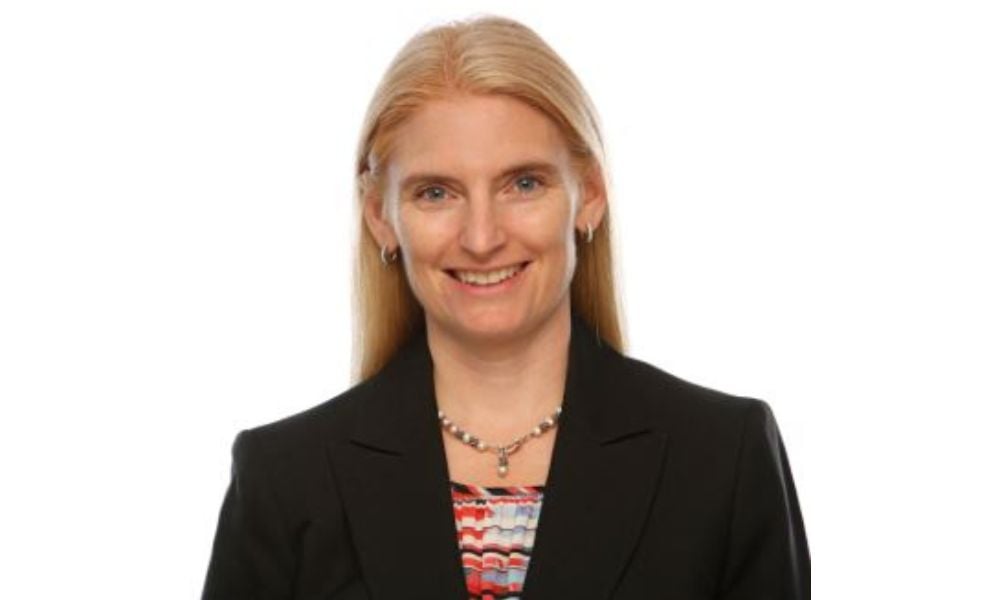
Fourth cohort will include diverse group of 16 candidates

A record 16 candidates will comprise the Women General Counsel Canada’s General Counsel University fourth cohort class, with Sandra Montanino as the program’s new executive director.
Nine candidates from the third cohort graduated on April 21, while the first and second cohorts boasted 12 graduates.
Launched in 2021, GCU features an intensive training program for women general counsel and senior legal department leaders. GCU has designed the program, based on Korn Ferry’s global competency framework, to enhance participants’ leadership skills in general counsel roles.
“We did some work with Korn Ferry about the traits and skills that make for sought-after GCs,” Montanino said.
What’s emerged over the experience so far is how valuable “stories” are to the candidates’ development – something GCU will emphasize as the fourth cohort wends its way through its program, which runs from September to April, once monthly on Fridays. The tuition cost is $5,000.
“The program is still built around the 12 Korn Ferry competencies, but, going forward, we will increase its focus on their intersection in terms of balancing or leveraging competing considerations in the workplace,” Montanino said. “All the competencies have some degree of judgment as part of their value proposition, and stories are particularly helpful in demonstrating how women GCs, who may experience the workplace in some unique ways, can nuance them.”
The diversity of candidates goes a long way to enriching the GCU experience. For example, the size and nature of the departments where the candidates work vary considerably, as does the precise nature of their roles within their organizations.
“Although our candidates are all either GCs or the highest-ranking female lawyer in their organizations, they are very diverse in their backgrounds and the sectors they come from,” Montanino said. “We have candidates from universities, from the non-profit spheres and from the corporate space, among others, and exposure to the variety helps people think outside the box in their day-to-day interactions.”
Competencies aside, the sense of community GCU fosters may be its most important aspect.
“There are no monologues or lectures here, and everyone is part of the conversation,” Montanino said. “Our candidates and teachers talk about things in a real, tactical way that frequently includes challenging each other.”
And when Montanino claims that the program has so far been a “tremendous success” with “overwhelmingly positive feedback” that focuses on “building on this even more,” she can point to a great deal of supporting evidence from former students.
Bindu Cudjoe, a first-cohort graduate, is the Toronto-based chief legal officer, chief inclusion and equity officer and corporate secretary at Laurentian Bank. She manages 11 lawyers and a team of 60.
“I was lucky enough to be part of the planning, design and development of this program, which is uniquely about leadership for senior woman lawyers and the particular challenges facing them,” she said. “The program is not about the latest and greatest in jurisprudence but about the ways in which we can bring the Korn Ferry competencies to life in a smaller community where we can learn together, center deep discussions and create an environment of trust.”
Getting to know her cohort members from across Canada, including Alberta, BC, Saskatchewan, New Brunswick, Quebec and Ontario, Cudjoe adds, was an “amazing experience.”
“We realized that we faced many of the same challenges and that there were different ways of tackling them,” she said. “We inspired each other.”
The network that emerged from the shared experience was, as Cudjoe saw it, the GCU’s most valuable outcome.
“Many of us might have peer groups in our companies, but they don’t have the same relationship with the CEO and management that we do, and they don’t wrestle with the same challenges, many of which – like the unprecedented pandemic times – we had in common. The kinds of things I’d talk about in GCU are very different from the conversations I have with my direct reports. At GCU, we could speak from a common point of understanding but without institutional constraint.”
Corrine Pruzanski, GC at Toronto-based Canadian Apartment Properties REIT for 12 years, participated in the third cohort.
“I’ve been taking time off to do an analysis of my own strengths and professional development and heard people raving about GCU,” she said. “My experience was with a Canadian public company, but GCU was an environment where people talk openly and can dissect their competencies with diverse lawyers on similar paths, including individuals working at NFPs and subsidiaries of international companies.”
Pruzanski speaks highly of the substantive aspect of GCU, which she said was “valuable for every career.” But the sense of community that developed also made a powerful impression.
“Women executives are few in number, so the role of female GC can be a bit of a lonely job,” she said. “What GCU did was give me the sense that I wasn’t alone anymore and that I now had a network of people to ask for help. It’s a niche that no one else has addressed.”
Toronto-based Hina Latif, vice-president, GC and secretary of Mercedes-Benz Canada Financial Services and Mercedes-Benz Canada, and was in the second cohort, had a similar experience.
“We developed a close network with whom we could discuss the challenges we were facing with colleagues at the same level,” she said. “Overall, interacting with the group increased my confidence and turned out to be an affirmation that I was doing something right.”